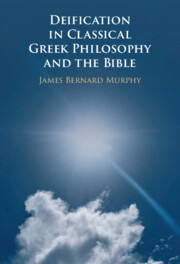Book contents
- Deification in Classical Greek Philosophy and the Bible
- Deification in Classical Greek Philosophy and the Bible
- Copyright page
- Dedication
- Epigraph
- Contents
- Introduction
- Chapter 1 Theology as Anthropology, Anthropology as Theology
- Chapter 2 Heroic Deification in Ancient Greek Religion
- Chapter 3 Ironic Deification in Socrates
- Chapter 4 Civic Deification in Plato
- Chapter 5 Developmental Deification in Aristotle
- Chapter 6 Deification as Intimacy with God in the Bible
- Conclusion
- Acknowledgments
- Select Bibliography
- Index
Conclusion
Athens and Jerusalem
Published online by Cambridge University Press: 10 July 2024
- Deification in Classical Greek Philosophy and the Bible
- Deification in Classical Greek Philosophy and the Bible
- Copyright page
- Dedication
- Epigraph
- Contents
- Introduction
- Chapter 1 Theology as Anthropology, Anthropology as Theology
- Chapter 2 Heroic Deification in Ancient Greek Religion
- Chapter 3 Ironic Deification in Socrates
- Chapter 4 Civic Deification in Plato
- Chapter 5 Developmental Deification in Aristotle
- Chapter 6 Deification as Intimacy with God in the Bible
- Conclusion
- Acknowledgments
- Select Bibliography
- Index
Summary
Both Socratic Greek philosophy and biblical religion endorse the human aspiration to become as much like a god or God as is humanly possible. This fact testifies to the important role that ideals of perfection play in human life. Against this fundamental similarity, however, important differences arise. First, in Socratic philosophy, deification rests on human not divine initiative. Socratic deification is primarily the product of rational self-discipline. The Bible, however, rejects as prideful this Greek ideal of self-deification. Biblical deification rests on divine not human initiative. Second, the gods of the Socratic philosophers are personifications of reason rather than divine persons. The gods of the philosophers are paradigms to be imitated rather than persons with whom we are in relationship. Third, the gods of the Socratic philosophers are cosmic gods whom we approach through the study of the orderly motion of the celestial bodies. By contrast, the biblical God is a divine person whom we approach through loving union with other persons, divine and human. Greek salvation takes us from here to there, from earth to heaven; biblical salvation takes us from now to then, from the present to the future.
Keywords
- Type
- Chapter
- Information
- Deification in Classical Greek Philosophy and the Bible , pp. 305 - 337Publisher: Cambridge University PressPrint publication year: 2024

